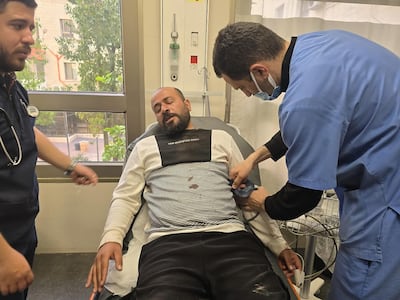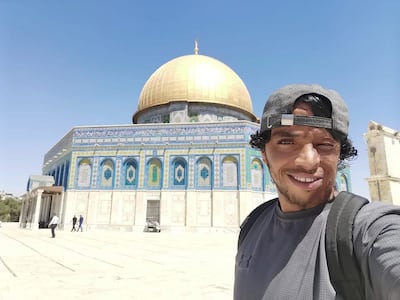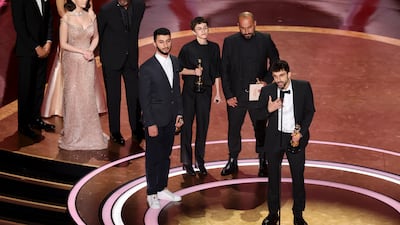No Other Land winning the Academy Award for Best Documentary Feature earlier this year was hailed as a landmark for Palestinian storytelling and for cross-border collaboration between Palestinian and Israeli filmmakers.
The film, which documents the threatened communities of Masafer Yatta in the occupied West Bank, gave its four directors a global platform and earned them recognition in Hollywood and beyond.
But in the months since, each member of the collective has confronted new and compounding pressures. The film’s Palestinian directors have endured raids, beatings and even a killing linked to their circle, while Israeli co-director Yuval Abraham has expressed frustration at what he sees as international indifference.
Despite these challenges, the directors have continued to present their work at festivals, using those stages to highlight the risks faced by their communities.
Hamdan Ballal

Palestinian co-director Hamdan Ballal was attacked in March, only weeks after stepping off the Oscar stage. He was beaten by Israeli settlers near his home village of Susya in Masafer Yatta. According to his wife, men in masks carrying weapons surrounded him and soldiers were present during the assault.
Ballal was subsequently detained by the Israeli army. He was blindfolded, handcuffed and taken to a military base. Fellow filmmaker Abraham said his colleague was beaten in detention and left without food before finally being released. Ballal suffered injuries to his head and stomach, and suggested the attack was intended as punishment for the Oscar win and the attention it brought to the community.
Yuval Abraham

Abraham, an Israeli journalist and co-director, has become the most vocal advocate for his colleagues. He criticised what he described as a muted response by the Academy to Ballal’s detention, saying the organisation initially failed to mention him by name.
In April, Abraham attended the International Journalism Festival in Perugia, Italy, where No Other Land was screened. After the showing he joined a public discussion on press freedom and accountability, drawing links between his reporting and the threats faced by Palestinian colleagues.
Abraham has also been the public voice after the killing of Odeh Hadalin, a consultant on the film, sharing witness accounts and saying Hadalin had been filming an attack by settlers on the village of Umm Al Khair when he was shot.
Basel Adra

Adra, a central voice in the film and a long-time chronicler of settler violence, reported that soldiers raided his home last week while he was at hospital with relatives injured in an attack. His wife’s phone was searched, his uncle briefly detained and his infant daughter was present during the raid.
Adra said he was blocked by military checkpoints from returning home. The raid followed days of settler violence in his village. He described the actions of soldiers and settlers as part of an ongoing effort to intimidate journalists and activists documenting life in Masafer Yatta.
Adra has continued to appear at screenings. No Other Land featured at Palm Springs International Film Festival in January and was programmed at Green Mountain Film Festival in Vermont, US, in March, shortly after the Oscars.
Odeh Hadalin

Though he is not a co-director, Hadalin, a Palestinian activist and consultant on No Other Land, was deeply involved in the project. In July, the father of three was shot dead by a settler during a confrontation in Umm Al Khair, a village in South Hebron Hills.
Witnesses said Hadalin, 31, had been filming when the altercation escalated. He was struck in the chest and died. The Israeli settler accused of the killing had previously been sanctioned by the US and EU for attacks on Palestinians. He was arrested, but soon placed under house arrest. Israeli authorities also delayed releasing Hadalin’s body.
Rachel Szor

Szor, the Israeli filmmaker who co-directed No Other Land alongside Ballal, Abraham and Adra, has remained less visible in the months after the Oscar. Her name appears in official credits and coverage of the award ceremony, but she has not been the focus of reported incidents.
The film has nonetheless continued to circulate at international festivals. The aforementioned Palm Springs and Green Mountain film festivals, it will appear at the Folkestone Documentary Festival in October, where panels with members of the team will discuss the risks of reporting from conflict zones.


